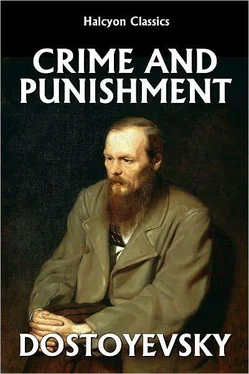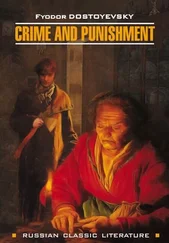There are chance meetings with strangers that interest us from the first moment, before a word is spoken. Such was the impression made on Raskolnikov by the person sitting a little distance from him, who looked like a retired clerk. The young man often recalled this impression afterwards, and even ascribed it to presentiment. He looked repeatedly at the clerk, partly no doubt because the latter was staring persistently at him, obviously anxious to enter into conversation. At the other persons in the room, including the tavern–keeper, the clerk looked as though he were used to their company, and weary of it, showing a shade of condescending contempt for them as persons of station and culture inferior to his own, with whom it would be useless for him to converse. He was a man over fifty, bald and grizzled, of medium height, and stoutly built. His face, bloated from continual drinking, was of a yellow, even greenish, tinge, with swollen eyelids out of which keen reddish eyes gleamed like little chinks. But there was something very strange in him; there was a light in his eyes as though of intense feeling—perhaps there were even thought and intelligence, but at the same time there was a gleam of something like madness. He was wearing an old and hopelessly ragged black dress coat, with all its buttons missing except one, and that one he had buttoned, evidently clinging to this last trace of respectability. A crumpled shirt front, covered with spots and stains, protruded from his canvas waistcoat. Like a clerk, he wore no beard, nor moustache, but had been so long unshaven that his chin looked like a stiff greyish brush. And there was something respectable and like an official about his manner too. But he was restless; he ruffled up his hair and from time to time let his head drop into his hands dejectedly resting his ragged elbows on the stained and sticky table. At last he looked straight at Raskolnikov, and said loudly and resolutely:
"May I venture, honoured sir, to engage you in polite conversation? Forasmuch as, though your exterior would not command respect, my experience admonishes me that you are a man of education and not accustomed to drinking. I have always respected education when in conjunction with genuine sentiments, and I am besides a titular counsellor in rank. Marmeladov—such is my name; titular counsellor. I make bold to inquire—have you been in the service?"
"No, I am studying," answered the young man, somewhat surprised at the grandiloquent style of the speaker and also at being so directly addressed. In spite of the momentary desire he had just been feeling for company of any sort, on being actually spoken to he felt immediately his habitual irritable and uneasy aversion for any stranger who approached or attempted to approach him.
"A student then, or formerly a student," cried the clerk. "Just what I thought! I'm a man of experience, immense experience, sir," and he tapped his forehead with his fingers in self–approval. "You've been a student or have attended some learned institution!… But allow me…" He got up, staggered, took up his jug and glass, and sat down beside the young man, facing him a little sideways. He was drunk, but spoke fluently and boldly, only occasionally losing the thread of his sentences and drawling his words. He pounced upon Raskolnikov as greedily as though he too had not spoken to a soul for a month.
"Honoured sir," he began almost with solemnity, "poverty is not a vice, that's a true saying. Yet I know too that drunkenness is not a virtue, and that that's even truer. But beggary, honoured sir, beggary is a vice. In poverty you may still retain your innate nobility of soul, but in beggary—never—no one. For beggary a man is not chased out of human society with a stick, he is swept out with a broom, so as to make it as humiliating as possible; and quite right, too, forasmuch as in beggary I am ready to be the first to humiliate myself. Hence the pot–house! Honoured sir, a month ago Mr. Lebeziatnikov gave my wife a beating, and my wife is a very different matter from me! Do you understand? Allow me to ask you another question out of simple curiosity: have you ever spent a night on a hay barge, on the Neva?"
"No, I have not happened to," answered Raskolnikov. "What do you mean?"
"Well, I've just come from one and it's the fifth night I've slept so…" He filled his glass, emptied it and paused. Bits of hay were in fact clinging to his clothes and sticking to his hair. It seemed quite probable that he had not undressed or washed for the last five days. His hands, particularly, were filthy. They were fat and red, with black nails.
His conversation seemed to excite a general though languid interest. The boys at the counter fell to sniggering. The innkeeper came down from the upper room, apparently on purpose to listen to the "funny fellow" and sat down at a little distance, yawning lazily, but with dignity. Evidently Marmeladov was a familiar figure here, and he had most likely acquired his weakness for high–flown speeches from the habit of frequently entering into conversation with strangers of all sorts in the tavern. This habit develops into a necessity in some drunkards, and especially in those who are looked after sharply and kept in order at home. Hence in the company of other drinkers they try to justify themselves and even if possible obtain consideration.
"Funny fellow!" pronounced the innkeeper. "And why don't you work, why aren't you at your duty, if you are in the service?"
"Why am I not at my duty, honoured sir," Marmeladov went on, addressing himself exclusively to Raskolnikov, as though it had been he who put that question to him. "Why am I not at my duty? Does not my heart ache to think what a useless worm I am? A month ago when Mr. Lebeziatnikov beat my wife with his own hands, and I lay drunk, didn't I suffer? Excuse me, young man, has it ever happened to you… hm… well, to petition hopelessly for a loan?"
"Yes, it has. But what do you mean by hopelessly?"
"Hopelessly in the fullest sense, when you know beforehand that you will get nothing by it. You know, for instance, beforehand with positive certainty that this man, this most reputable and exemplary citizen, will on no consideration give you money; and indeed I ask you why should he? For he knows of course that I shan't pay it back. From compassion? But Mr. Lebeziatnikov who keeps up with modern ideas explained the other day that compassion is forbidden nowadays by science itself, and that that's what is done now in England, where there is political economy. Why, I ask you, should he give it to me? And yet though I know beforehand that he won't, I set off to him and…"
"Why do you go?" put in Raskolnikov.
"Well, when one has no one, nowhere else one can go! For every man must have somewhere to go. Since there are times when one absolutely must go somewhere! When my own daughter first went out with a yellow ticket, then I had to go… (for my daughter has a yellow passport)," he added in parenthesis, looking with a certain uneasiness at the young man. "No matter, sir, no matter!" he went on hurriedly and with apparent composure when both the boys at the counter guffawed and even the innkeeper smiled—"No matter, I am not confounded by the wagging of their heads; for everyone knows everything about it already, and all that is secret is made open. And I accept it all, not with contempt, but with humility. So be it! So be it! 'Behold the man!' Excuse me, young man, can you… No, to put it more strongly and more distinctly; not can you but dare you, looking upon me, assert that I am not a pig?"
The young man did not answer a word.
"Well," the orator began again stolidly and with even increased dignity, after waiting for the laughter in the room to subside. "Well, so be it, I am a pig, but she is a lady! I have the semblance of a beast, but Katerina Ivanovna, my spouse, is a person of education and an officer's daughter. Granted, granted, I am a scoundrel, but she is a woman of a noble heart, full of sentiments, refined by education. And yet… oh, if only she felt for me! Honoured sir, honoured sir, you know every man ought to have at least one place where people feel for him! But Katerina Ivanovna, though she is magnanimous, she is unjust… And yet, although I realise that when she pulls my hair she only does it out of pity—for I repeat without being ashamed, she pulls my hair, young man," he declared with redoubled dignity, hearing the sniggering again—"but, my God, if she would but once… But no, no! It's all in vain and it's no use talking! No use talking! For more than once, my wish did come true and more than once she has felt for me but… such is my fate and I am a beast by nature!"
Читать дальше












